Anne Schwarz
Anne Schwarz is a German motorcyclist who lives in South Africa and rides off-road there. She gives us an insightful look at what the life of a motorcyclist in South Africa and its surrounding areas is like. [Rashmi Tambe, Editor]
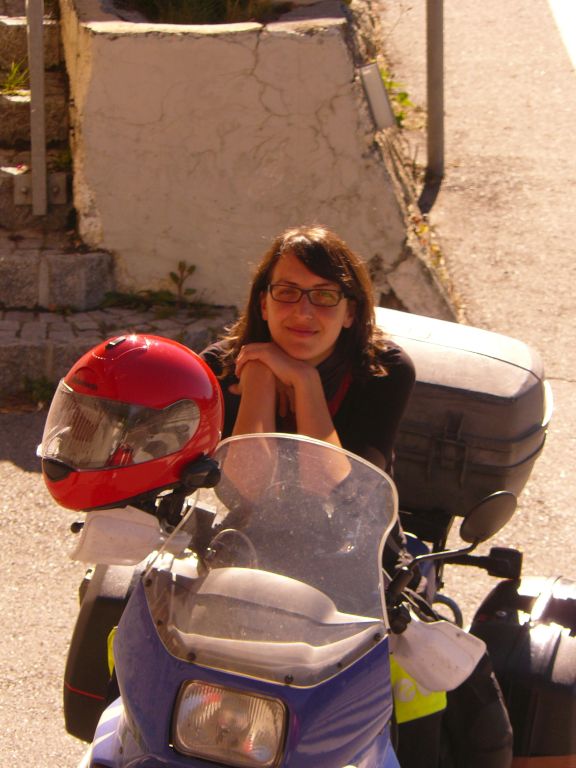
Please introduce yourself. My name is Anne Schwarz. I’m from Germany but currently live and work in South Africa. I had a fantastic time here in SA, but it is coming to an end very soon, as my husband Jan and I will leave for our very own “Long way Home” in early May, travelling with our two motorcycles through East Africa up to Europe.
What is your first ever memory involving motorcycles? Apparently my grandma had an old Zuendapp which she rode daily, but I don’t recall that motorcycle. I think she stopped before I was born.
Nobody in my family rides, but when I was somewhere around 7-9, my mom had an apprentice for Hauswirtschaft (domestic economy) staying at our house for a while. She was awesome! She was black with great curly hair, came from the city, had two tattoos of a unicorn and a rose, and… she rode a motorcycle. Though my mom would never ever have allowed me to ride with her, I was completely smitten. She was kind enough to write in my “friends” book. Under hobby, she wrote: My motorcycle. She was the coolest woman I had met, and though it took me a long time to finally get on a bike myself, I am pretty sure she triggered that livelong desire.
Do you have a motorcycling achievement that you’re particularly proud of? I am a very careful rider, and one could say I am even fearful sometimes. When we hit our first dirt roads in South Africa, I changed. Dirt roads are something completely different. Here it is not about going fast and low in a tight turn. It is about mastering the terrain, finding your way past rocks and across ravines and holes, swinging around on the bike to keep the balance, no cars to speak of… I loved it! I felt so comfortable, and I sped off and left my hubby behind me eating my dust. Off-road riding has shown me that though I am not the best road rider, that does not mean I am a bad rider. I am actually a good one in terrain that freaks other people out.
Another thing is that I am now also comfortable with having a pillion behind me. My husband is one of these great, rare guys who doesn’t think it is unmanly to ride pillion and who always encouraged me to try and master this. When we had just one bike, we shared the riding equally. Riding on dirt roads through Swaziland with a pillion behind me has gained me incredulous looks and hearty handshakes by (mostly male) motorcyclists.
Are you a solo rider or do you like riding with others? I ride with my husband mostly. Partly because we just like to spend time with each other, but also because I am in general more of a company rider. Nicer for the breaks in between, to chat about what you have seen and how the road was, but also because with dirt roads, it is recommendable to have someone with you if your bike breaks down or you drop it in a stupid angle and can’t lift it up.
Tell us more about your current motorcycles. I own a BMW R 1100 GS, and a BMW F650GS Dakar. The latter one is the one I ride here in SA, and will also ride up East Africa come May. The 1100 is currently in Germany and I might probably sell it. I initially bought it because I wanted to have a more “mature” and trying bike than the Transalp of my then-boyfriend which I rode most of the time. Looking at what I could afford and what give me the best value for money as well as resale price, I decided for the 1100. And also: it does not have a chain! I am dirt lazy in maintenance. The fact that I would never have to lube or clean the chain was a definite pro! I did not ride the 1100 for that long (as we then moved to South Africa), but I loved the power and the humming sound of the boxer engine. I miss it a bit.
When we arrived here, we looked for a bike that would serve both road and off-road. We bought the Dakar, and my husband really took to the bike. I find it a bit heavy for off-road. I am an “untidy” rider, I like to throw the bike around but then struggle to hold it up. When I tried other, lighter bikes they did not feel right. And as we had decided to go up Africa and wanted the same bikes for that to save on spare parts and the like, I also bought a Dakar for me. I get more and more comfortable with her, and I know for me it’s just the lack of practice – which will change during the next months.
If you could design your dream motorcycle, what would it look, feel and ride like? It would have the balance, measures and the power of the KTM 640, the reliability and easy-to-repair-air of a Russian no-name bike, and the weight of a moto-cross bike. Plus the cosy humming of the BMW boxer motor. I know, impossible to build.
What was the last awesome ride you went on? The Mountain Kingdom of Lesotho! Lesotho is a tiny little state right in the middle of South Africa, and is mostly dominated by its beautiful mountain range the Drakensberg. Lesotho has a successful history of maintaining its independence during the rough times when colonial forces took Africa apart, but as during the years the Basotho (the people of Lesotho) were forced to sign off more and more of their more fertile and accessible land in the flat areas, it has and is still fighting with a very weak economy. Most of the country is very rural, meaning people still living in classic Rondavel huts without running water and scarce electricity, and tar roads – mainly build by the Chinese, who are busy building roads all over Africa now – occur mostly in the west close to the capital.
We were a bit wary, as there was a time when foreigners gave motorcyclists a bad name in Lesotho: some riders thought it pretty cool to ride offroad across the hillsides where people keep their cattle. There were reports about angry herders and kids throwing stones and pulling wires across the roads. We stuck to the roads and did not experience any of this. There were mostly very nice and helpful people, and absolutely stunning views. It took us a full day to complete 180 km because the quality of the partly washed out gravel-and-dirt roads is not very good. It makes for some fun riding, but I managed to drop the bike twice when I was getting tired, and was very happy for the hot shower and soft bed we got in a missionary station in Thaba Tseka. In total, we only stayed in Lesotho for three days, but we enjoyed it a lot and hope we can go back some time.
How do you keep your skills sharp? We did some off-road trainings here in SA, that was great!! I try to stay sharp by doing “gymnastics” on the bike, as I call it. Jumping around a bit, changing positions, kneeling on the seat, standing on one side only… and also “bunny hops” on the speed bumps in the neighbourhood.
Have you had any mentors who contributed to your growth as a motorcyclist? Yes, a friend here, Jolandie Rust, who is the first woman to circumnavigate Africa alone on a bike. And Judy, our offroad riding instructor – an amazing, crazy, wild woman!
Is there anything in the current motorcycling industry that you would like to see change? When I see pink flower applications on motorcycle gear I throw up. I have no problem at all with stylish motorcycle gear – but some companies believe that putting some pink flowers or girlish colours equals style and will make women scream with joy!
And in general, I want to see more women featured in motorcycle media – and featured as normal riders, not in some ladies special. And in interviews with female riders, they should focus less on why they as a woman ride, and more on the questions they would also ask men.
If you could re-design the world to make it more motorcycle-friendly, what would it look like? All cars and trucks and so on to have mirrors that cover all areas when they look back. Also warning sounds when they want to change lanes and there is an object in their way or coming their direction.
Do you have any advice for people who want to get into motorcycling? Don’t believe others that tell you that this is the only way to ride, that women are too afraid to ride, that you as a women will stop anyway once you have kids, that you are riding the wrong bike, wearing the wrong gear or generally are wrong.
Find people who do not think they have found the holy grail of motorcycling but who simply love to ride and share the joy. If you are straight, dump any man who says he can never ride pillion because that will make him less of a man. Dump any man who will put pressure on you to ride different to what you feel comfortable with at that moment. If you are LGBIT, this of course applies also to your relevant partner.
And finally – just get on the bike and ride.
RIDING IN SOUTH AFRICA
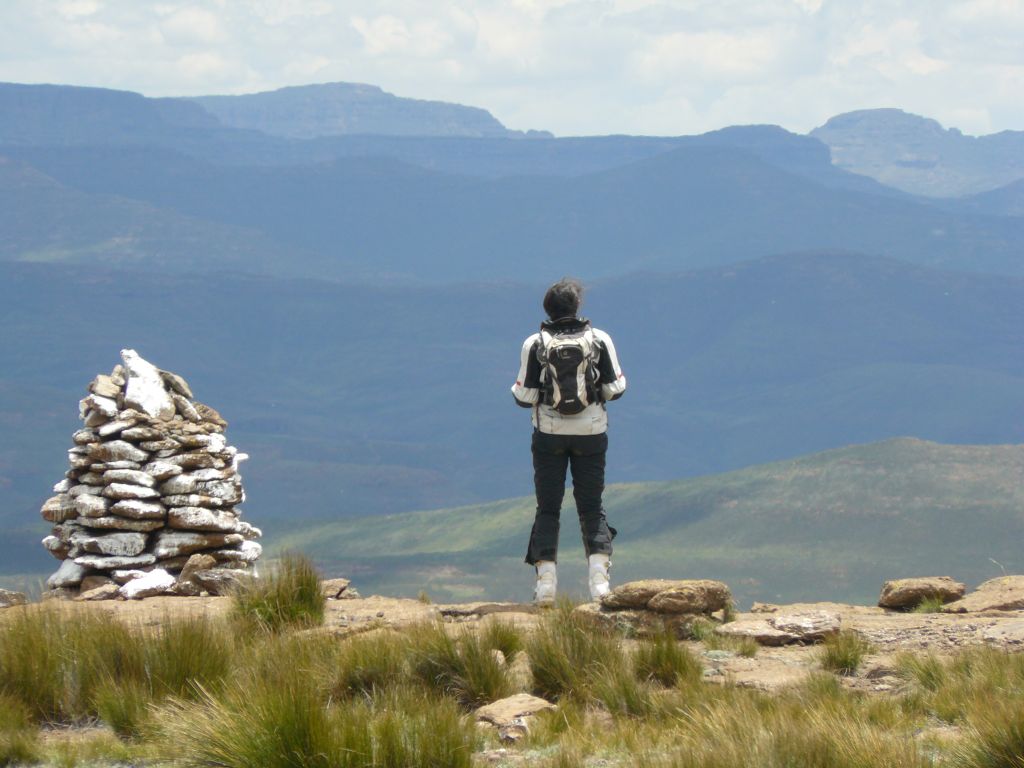
What’s your classic Sunday ride? A nice Sunday morning ride is from Johannesburg to Parys and back. It’s some kms on the highway first, but then you go off through a unique, beautiful landscape. It’s really unique because it was formed by a giant meteorite impact some thousands of years ago. And all that on nice, easy dirt roads.
In between, you might pass a private game reserve, with giraffes curiously looking over the fence. You pass through tiny dwellings and take a rest next to the church, listen to the singing and watch the beautiful Sunday-dressed ladies make their way down the road. You cross a beautiful, wild river on a slab of concrete called a bridge. Then you hit Parys, a town flooded by local Sunday tourists (mostly biking) and have an early lunch. And then back home.
What ride would you recommend to visiting riders? I’d go to the Drakensberg for a 3-4-day ride. Stunning. Going Southwards from Johannesburg, leaving the highway after Estcourt and driving towards Underberg. Then a days break at Cobham, sleeping in one of the caves or camping and exploring the Drakensbegr on foot. Then the next day up early to Sani Pass, lunch at the pub and down again to South Africa.
Are motorcyclists discriminated against in any way? They are in constant danger here in SA, as two-wheelers (also counts for bicycles) are not respected at all. But no legal discrimination.
How popular are motorcycle related sports? Here, it’s rather off-road riding. And yes, women participate.
What can one expect to see while riding around SA? South Africa is incredibly diverse, from the dry, wide landscapes of the Karoo and Northern Cape to the semi-jungle in the lowfeld around Nelspruit and at the coast around Durban. And of course, the Western Cape with it’s beautiful green hills in the winelands, and the special dry, “stony” landscape in Gauteng.
What are the best months for riding there? Be very careful if you ride from December to January. During this time most South Africans are on leave from work, everybody drives around the country to visit their friends and family and literally everybody gets drunk.
Is motorcycle theft a problem? Not too much, car theft is fairly more common. Still, we do not park the bikes on the street during the night.
Is it challenging to ride in the area you live in? Lots of potholes in some regions of the cities and in the rural areas. And of course the other drivers are a threat.
How are women riders treated? With encouragement and praise!
Is the motorcycling scene fairly diverse? The motorcycle scene in South Africa is fairly divided still into racial groups – black people rather ride choppers, street or sport bikes. The off-road, overland, and enduro scene is dominated by white people, both English and Afrikaans speaking. I have heard some of these white people make racist comments, so I think that besides the obvious barrier (in general in SA, races still often do not really mix) , there is also some active “keeping-them-out” behaviour involved.
I once had some drinks at a black motorcycle clubhouse in Soweto and had nice chats with the people there, both women and men. There were no whites in that club, though I think if I had a race or street bike I would have been welcome to join.
Though SA has a progressive legislation concerning LBGIT, the general culture, both black and white, is quite conservative. I think that LBGIT people might run into some issues in either group if they express their sexuality too openly. ![]()

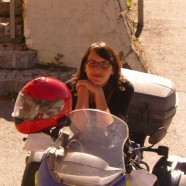





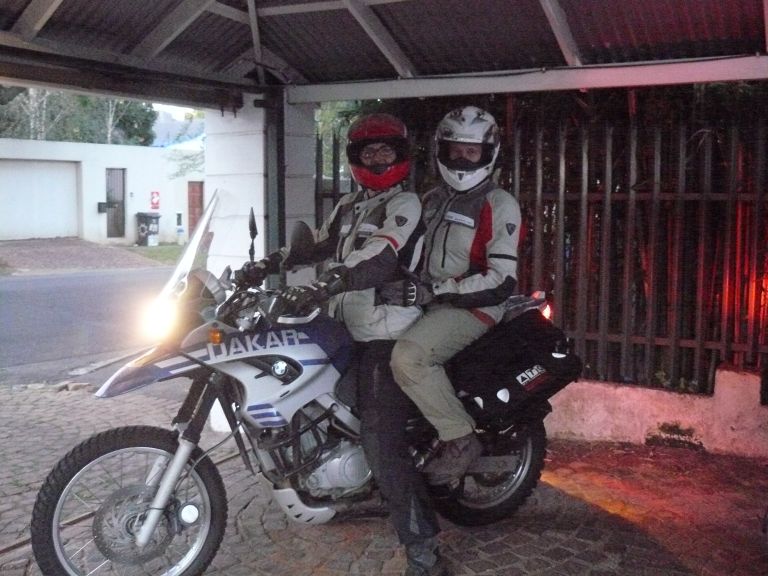
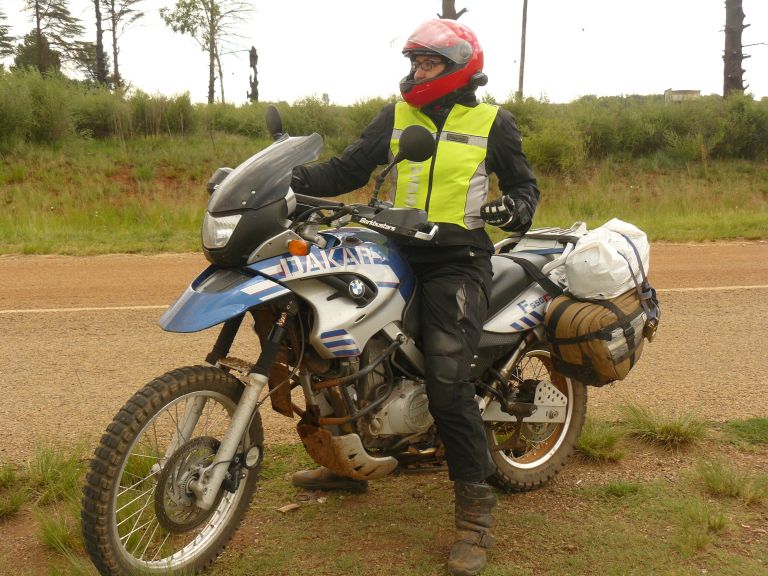
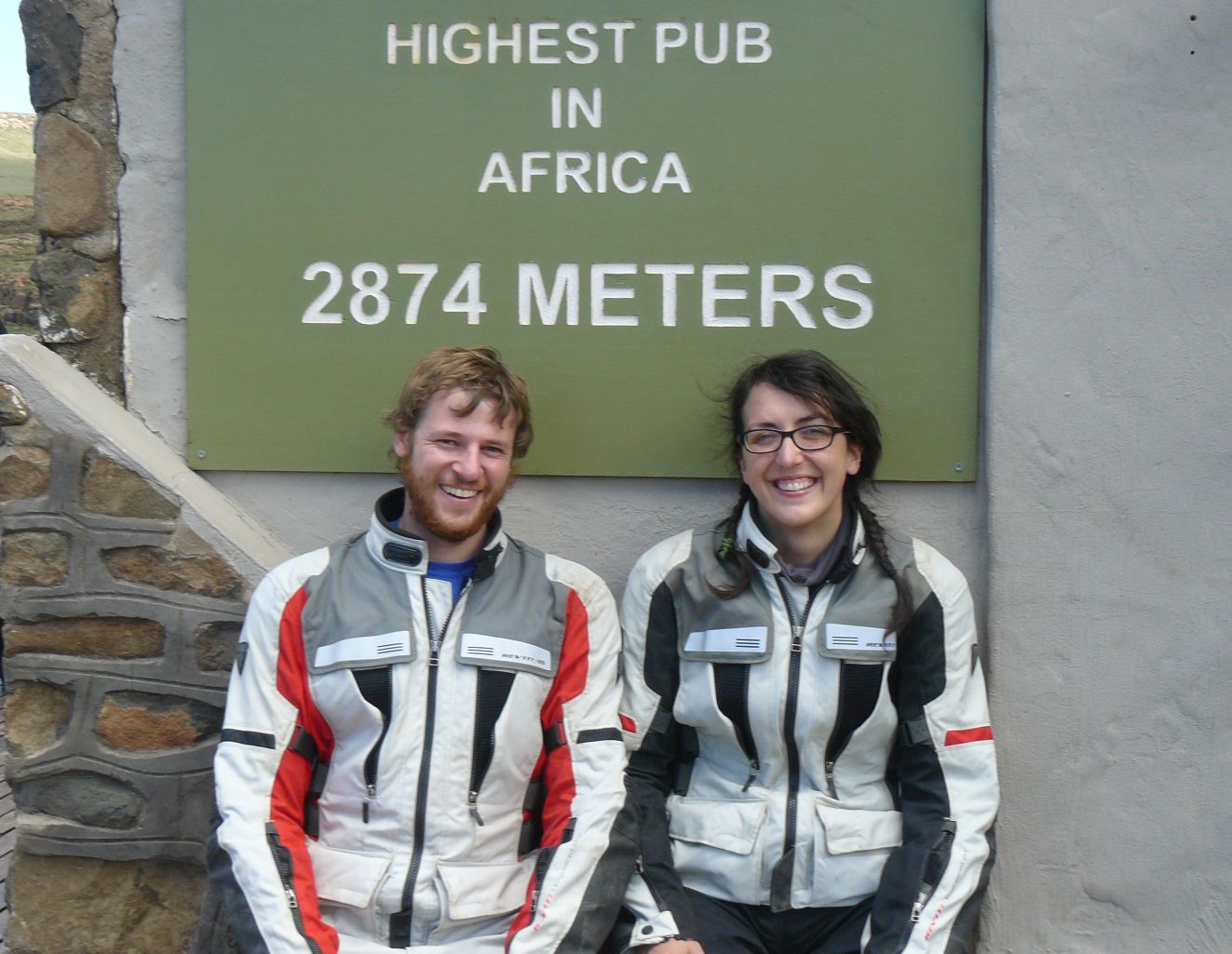
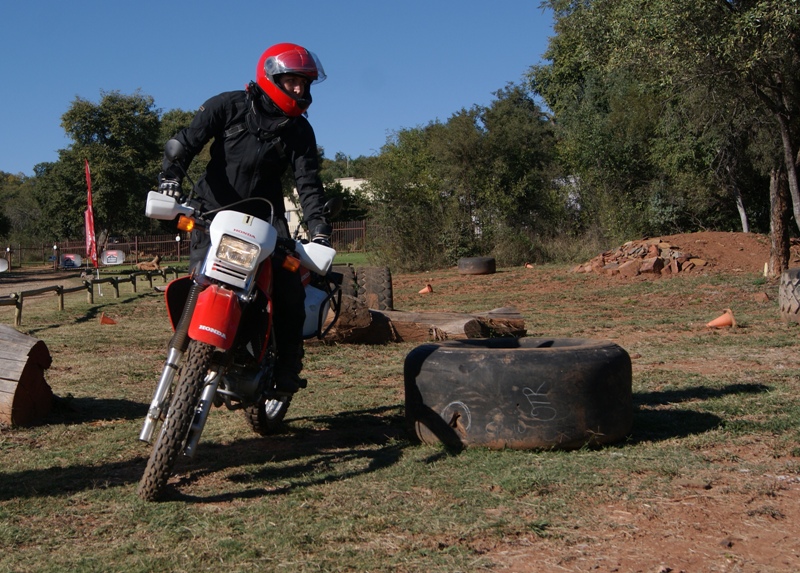
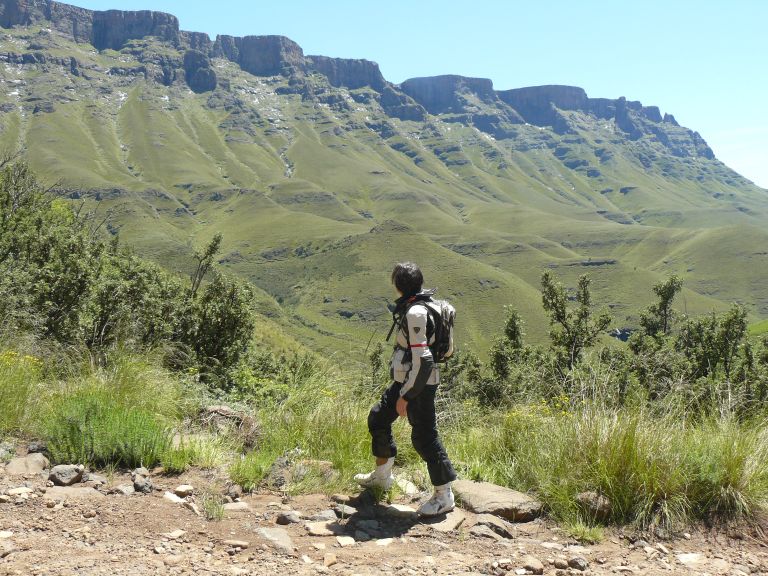
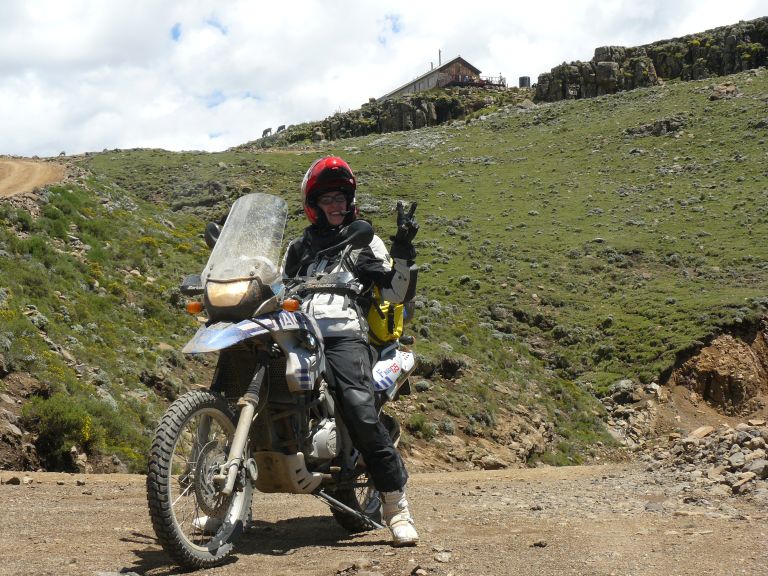
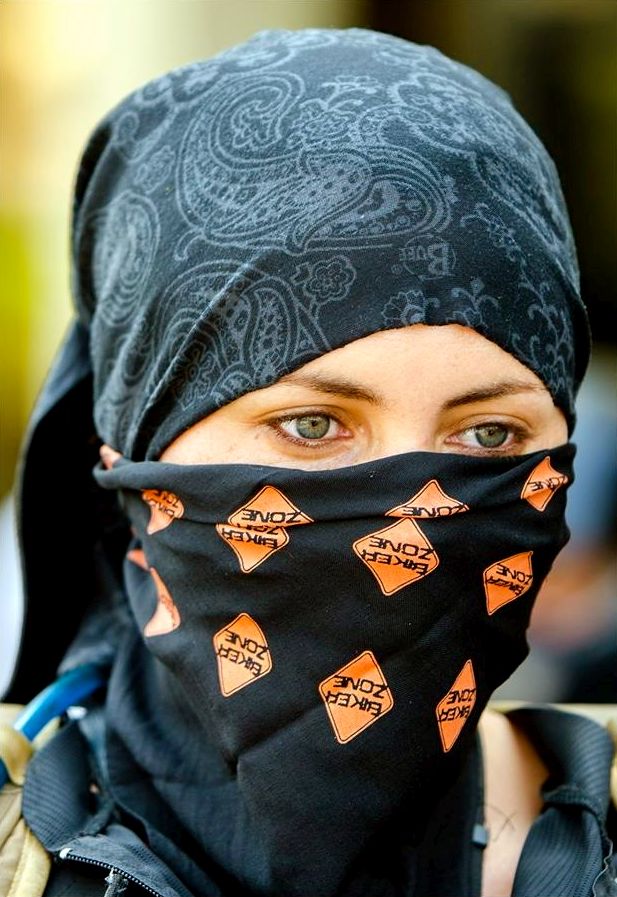
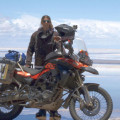
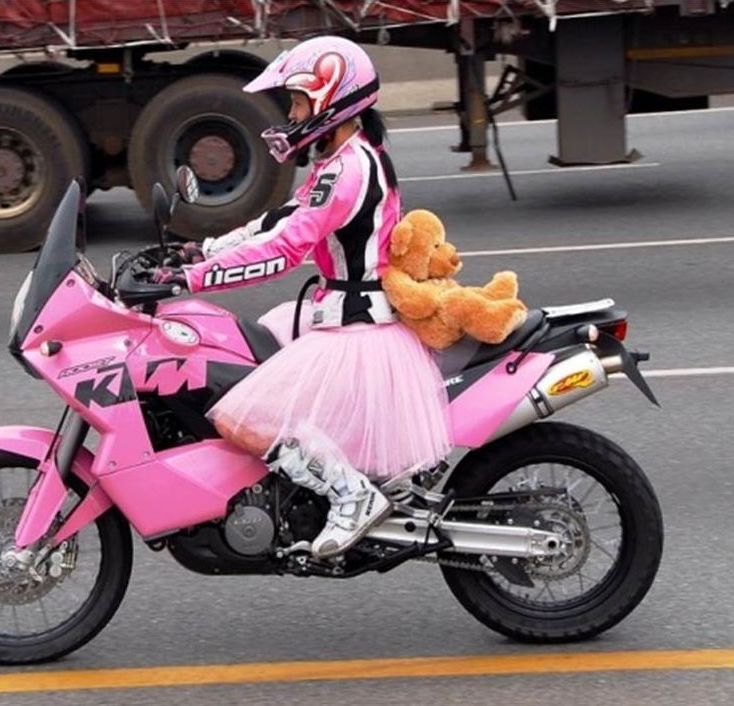
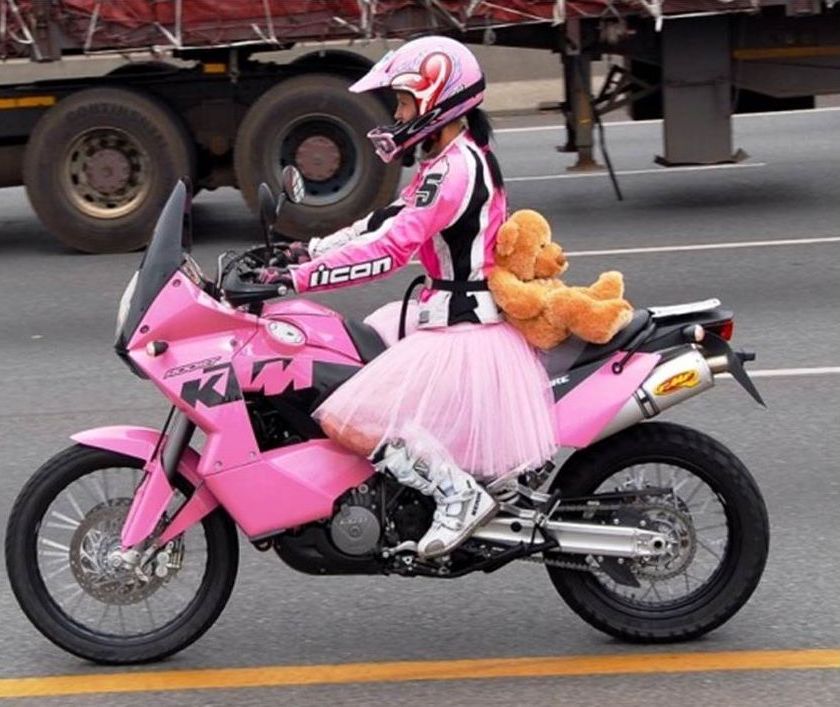
Awesome stuff! Really great reading! Loved it. :)
Super reading Anne. I know you will have a fantastic trip home! Looking forward to the ride report…
High Janne,
wir wünschen Euch gutes Wetter, nette Kontakte und schöne Erfahrungen unterwegs. Auch Unfall-und Pannenfreiheit. Und eine gesund Rückkehr nach Frankfurt. Wir sehen uns dort!
Gruss Thomas und Brigitte aus Aalen
Excellent stories and perspectives! Is this trip home in May happening in 2016? Will you write about it?